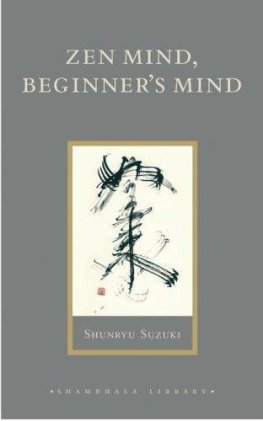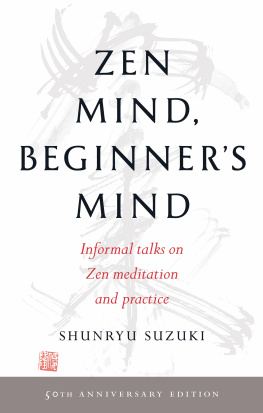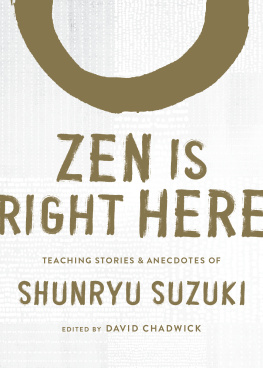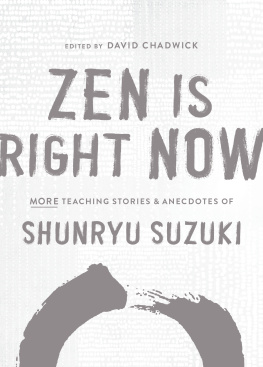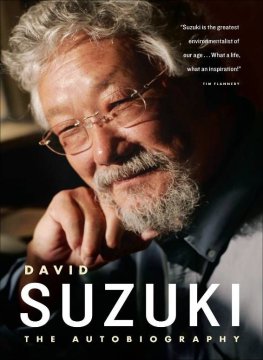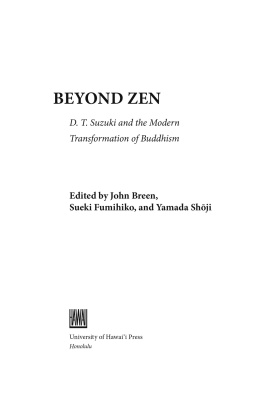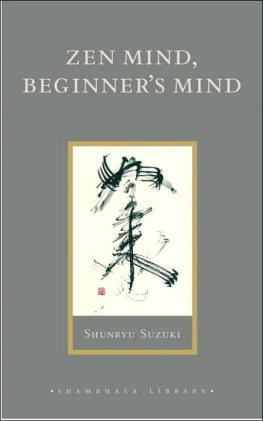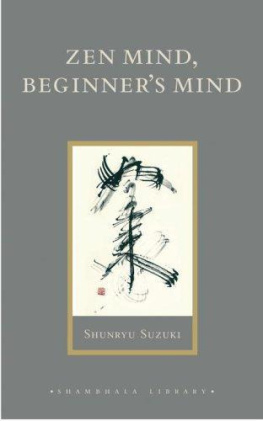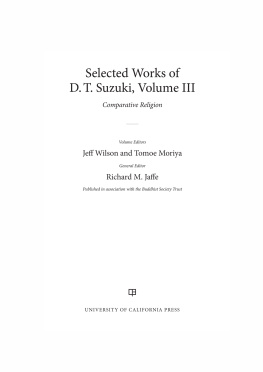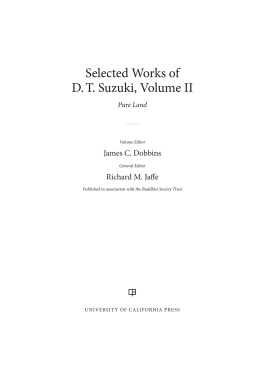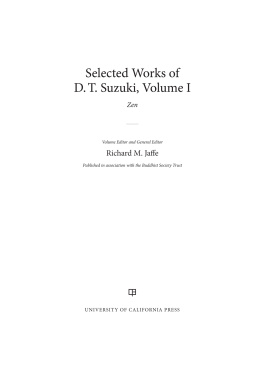Introduction
Always with You
Shunryu Suzuki Roshi died on December 4, 1971. His students at Tassajara Zen Mountain Center had begun a sesshin, a week-long meditation intensive, on December first, while in San Francisco where Roshi was staying, a sesshin began at 5:00 a.m. the morning of the fourth. As his students settled into the first period of zazen [sitting meditation] in the zendo [meditation hall], upstairs in the company of his chosen successor Richard Baker Roshi, his wife Mitsu and son Otohiro, the master left this world. He had waited to depart until most of his students were meditating and would be meditating for several more days. That was a parting gift.
Hundreds of people crowded into the Zen Center for his memorial service, and the next day, I believe, about eighty people journeyed to Colma for a final good-bye. Before the casket disappeared into the fire, we had a ceremony: each person placed a red rose in the casket while all of us chanted. Watching people offer their roses, I was struck by how much everyone loved Suzuki Roshi. Whatever other feelingscalm, sad, frightened, proud, discouragedmay have characterized a person, the gesture of extending an arm and releasing the rose was suffused with love. That was another parting gift.
The first book of his lectures, Zen Mind, Beginners Mind, popularized Suzuki Roshis expression beginners mind" as a metaphor for awakening, a paradigm for living. Keep finding out, dont stick to what you already know: In the beginners mind there are many possibilities. In the expert's mind there are few. Thirty years later, Zen Mind, Beginner's Mind continues to be one of the worlds best-selling books on Buddhism. Now we have edited a few more of his lectures to share his simple yet powerful teachings. The teaching, he said, is just for you. Perhaps as you go on your way you will feel Suzuki Roshis presence in your life: a wise, warm-hearted friend, an unseen companion in the dark. This is what his words have to offer, an opportunity to awaken the teacher in you, your own aware inwardness, You are Buddha, and you are ordinary mind.
What is most difficult for any teacher, especially a Zen teacher, is to teach without teaching anything. If I tell you something, Suzuki Roshi said, you will stick to it, and limit your own capacity to find out for yourself. But, as Katagiri Roshi said, You have to say something, because if the teacher says nothing, the students wander about sticking to their habitual ways of being. So the temptation is to be brilliant and give out answers, yet that may simply be gouging a wound in good flesh, as the saying goes. Now, instead of being self-reliant, the students turn to the teacher all the more, and the teacher wonders why the students are so needy and so slow to figure things out. However, in the presence of those teachers who give us nothing to stick to, we sense ourselves awakening. What will we do? It is called "freedom or liberationwe are profoundly on our ownand profoundly connected with everything.
Quite possibly, Suzuki Roshi's struggle to speak English invigorated his teaching. Did he mean to say things as it is? Was that improper English or was it a teaching? That the expression appears several times in this volume points to the latter. What, then, was his teaching? The more we try to pin it down, the more elusive it gets, yet as disciples and students, as fellow seekers, we often attempt to see if we got it. Can we express it? Can we speak it? What are the words which will turn our lives in the direction of realization? in the direction of benefiting others?
Would enlightenment help us? Suzuki Roshi dismisses the idea of aiming for some special experience, which will change our lives forever, as "a mistake, as sight-seeing practice." Yet he does not dispense with enlightenment. This, he says, is to forget this moment and grow into the next. Wherever you are, he says, enlightenment is there. And how are we to experience that?
One thing Roshi keeps mentioning is to practice shikantaza. Commonly translated as just sitting, it could also be described as not suppressing and not indulging thinking. But Suzuki has various ways to express it. Live in each instant of time, or Exhale completely." It is one of those expressions that can be endlessly explained and not explained at all, and certainly if you ever stop to wonder if this is shikantaza, it probably isnt. On the one hand , shikantaza points to this not that, as in Exhale completely, disappearing into emptiness. This is shikantaza. It is exhaling rather than inhaling, disappearing rather than appearing. On the other hand, it points to non-differentiation. To live in each instant of time is to express yourself fully, to expose yourself as you are. Perhaps we could see this fullness as another form of disappearing, a wholeness of being which covers everything. One side is clearing away the monkey mind, the other side is realizing yourself, making yourself real. So how will we recognize shikantaza and should we aim to attain it? "Stand up on the ground. Stand up on emptiness." "Shikantaza is just to be ourselves."
The Roshi's way was unfathomable. His teaching was not to stick to anything, and in his teaching he did not stick to any one way. Here are some stories by way of example.
One day Suzuki Roshi told me to sit right in front of him in the meditation hall so when you fall asleep and start nodding, I will notice right away and I can get up and hit you. He would use his short wooden stick for the hitting, and I would wake up. At least for a few moments the air and my mind would be clear, still, and quiet, yet vibrant and awake. I felt honored that he cared enough to get up from his meditation and hit me. I would have been sitting quite straight and alert for about thirty minutes before nodding off, and then he would be there: Wap-wap! Wap-wap! As a Zen student, he said, "you should try to meet someone who is as sincere as you.
Everything would drop away. Before his double striking of the shoulders, his stick would rest briefly on the shoulder just to the right of the neck, and we would place our palms together and bow, leaning forward with our head tilted to the left. Then after he had struck the right shoulder, we would lean to the right to receive his blows on the left. The blows themselves were inconceivably sudden and striking, not in the sense that they were physically intimidating, but they could not be anticipated or timed, so no thought, feeling, or sensation could stand up to them. Rather than knocking some sense into you, it was more like knocking the floor out from under you. This could be quite unsettling, but on the other hand quite grounding. For a few moments one could taste freedom from everything, a sense of spaciousness. Dont stick to anything, he said, not even the truth. When you practice as though this were your last moment, you will have freedom from everything. Then sooner or later there would be a groping around for something to grasp, something to focus on, something to do something about. The world of things would reappearsomething to deal with and obsess about. Hows it going?
Other times when I struggled to sit still, Suzuki Roshis hands would rest motionlessly on my shoulders, touching me through and through. My breath would soften and lengthen. Tension would release, and my shoulders would start to radiate with warmth and vitality. Once I asked him what he was doing when he had his hands on my shoulders, and he said, Im meditating with you.
Its quite rare to be touched like that, receptively and openly, with kind regard. Most touch says, Go over there or Get over here, Straighten up or Calm down. This touch said, Ill be here with you wherever you are. Im willing to touch whatever it is. That was the spirit of his meditation, the spirit of his teaching, Sit with everything. Be one with everything." Innumerable people were touched by Suzuki Roshis presence and by his teaching, each of us in our own way responded to his kind and upright regard, his meditating with us.


